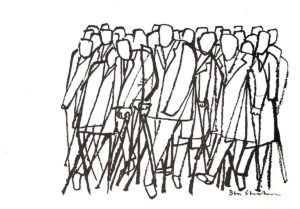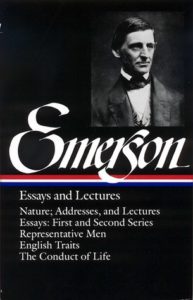Emerson & the tyranny of the masses.
“Masses are rude, lame, unmade, pernicious in their demands and influence; I wish not to concede anything to them, but to tame, drill, divide, and break them up, and draw individuals out of them”
Maria Popova/brainpickings
When you adopt the standards and the values of someone else,” Eleanor Roosevelt wrote in her timeless meditation on happiness and conformity, “you surrender your own integrity [and] become, to the extent of your surrender, less of a human being.” And yet we exist within a society, as individual particles that coagulate into the so-called masses, awash in societal standards that often permeate our consciousness without our conscious consent or even awareness. How, then, do we mediate between the inescapable social dimension of our lives and the unassailable integrity of individual personhood?
Wedged in time between Søren Kierkegaard’s keen insight into the psychology of conformity and Nobel laureate Elias Canetti’s incisive treatise on crowds and powerwas another intellectual titan of the human spirit, Ralph Waldo Emerson (May 25, 1803–April 27, 1882), who addressed this question in an essay titled “Considerations by the Way,” found in his indispensable Essays and Lectures (public library | free download).
With spirited disdain for conformity, Emerson writes:
Leave this hypocritical prating about the masses. Masses are rude, lame, unmade, pernicious in their demands and influence, and need not to be flattered but to be schooled. I wish not to concede anything to them, but to tame, drill, divide, and break them up, and draw individuals out of them… Masses! the calamity is the masses. I do not wish any mass at all, but honest men only, lovely, sweet, accomplished women only, and no shovel-handed, narrow-brained, gin-drinking million stockingers or lazzaroni at all. If government knew how, I should like to see it check, not multiply the population. When it reaches its true law of action, every man that is born will be hailed as essential. Away with this hurrah of masses, and let us have the considerate vote of single men spoken on their honor and their conscience.
[…]
The majority are unripe, and have not yet come to themselves, do not yet know their opinion. That, if they knew it, is an oracle for them and for all.
But Emerson is careful to recognize that such ripeness of conscience and character, which aligns with Einstein’s notion of “spiritual genius,” isn’t evenly distributed among the population — the most honorable and conscious individuals, he argues, are rare to come by, yet they are the ones responsible for humanity’s greatest and most lasting feats of creativity and intellect. More than a century before Jacob Bronowski asserted that “the creative personality is always one that looks on the world as fit for change and on himself as an instrument for change,” Emerson writes:
Nature makes fifty poor melons for one that is good, and shakes down a tree full of gnarled, wormy, unripe crabs, before you can find a dozen dessert apples… Nature works very hard, and only hits the white [of the bull’s eye] once in a million throws. In mankind, she is contented if she yields one master in a century. The more difficulty there is in creating good men, the more they are used when they come… All revelations, whether of mechanical or intellectual or moral science, are made not to communities, but to single persons. All the marked events of our day, all the cities, all the colonizations, may be traced back to their origin in a private brain. All the feats which make our civility were the thoughts of a few good heads.
The hope, of course, is that in the century and a half since Emerson’s day — a time when such “good heads” belonged only to white men — we have created and must continue to create more and more opportunities for greatness across all sections of the population, so that the revolutionary “revelations” Emerson extols may come from a kaleidoscope of perspectives, building toward a more beautiful and just humanity. But such a mission would only succeed on the wings of the same necessary rejection of mob mentality, the same dismantling of the mindless masses into thinking individuals, that Emerson himself so spiritedly espoused.


Leave a Reply